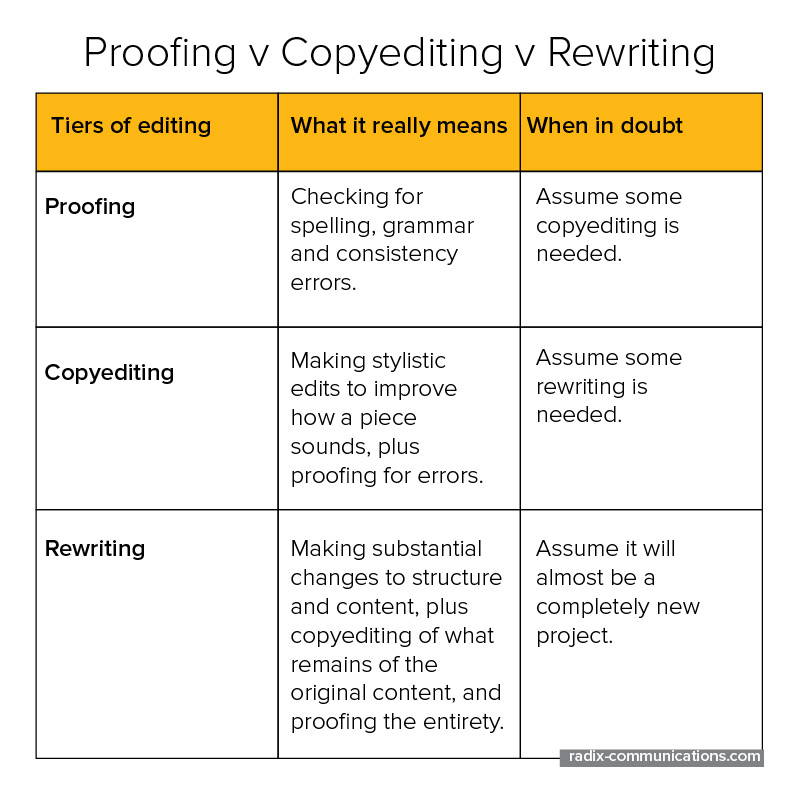As copywriters, we’re often asked to “finesse” or “wordsmith” someone else’s copy. It’s often content that’s been written by one of the business’ subject matter experts (SMEs) or, less frequently, something that another writer or agency has worked on which didn’t quite hit the mark.
Copyediting existing work is a complicated business. It’s rarely as simple as swapping out a few words or tightening up the grammar – which means, most of the time, it’s better to ask your copywriter to start from scratch.
Here are a few reasons why:
1. It’s more efficient to brief a writer than to do it yourself
Often, marketers hope it’ll be quicker or more economical to ask an SME to write up a draft of their piece before passing it onto a copywriter or editor for a quick tune-up to make sure it’s up to scratch.
But that’s rarely the most efficient way to use your time. Finding half an hour in an SME’s busy diary to brief a copywriter is far easier than carving out several hours to write a blog – or days to write an ebook.
There’s another benefit to talking to a copywriter before a single word is written: a briefing call is the perfect opportunity to sound out your ideas with someone who’s trained to ask probing questions. A writer can help your SME dig into the topic, think about it in different ways, and find the best story to tell from a marketing perspective – ideal if your SME is on the technical side of the business.
That leads me onto my next point…
2. Subject matter expertise doesn’t always translate into writing expertise
Just because SMEs know a subject inside out, doesn’t mean they’ll be able to write about it in an engaging way that appeals to your target audience. And why should they? Even if your SME regularly writes technical documentation, writing good marketing copy takes a totally separate skillset.
Writers take your SME’s knowledge and ideas and consolidate them into a compelling story, finding the right hook and the structure that neatly guides readers to the end and the call to action.
Your copywriter will also have experience in conforming to voice and tone guidelines, using the right SEO keywords, and working in templates. They’ll have a good understanding of how to write in a way that appeals to your target personas, and strategies to encourage your audience to click that “get in touch” button.
When it’s written from scratch by a copywriter, your piece will have all the features that make content valuable – from the very beginning. It’s much harder to come along and squeeze keywords into someone else’s draft, for example.
3. It might need much more work than you expect
It’s difficult not to get attached to something you’ve written, especially if you’ve spent hours on it. Which means it can be a nasty surprise when your SME opens up the document after a copywriter has done some “wordsmithing” to find something that looks like a totally different piece.
From the writer’s side, it can be hard to estimate how much editing a piece needs until you’ve had a comprehensive look at it (or even until you’ve started working on it). On rare occasions, it might just need some trimming or the odd sentence rewriting to make it the best it can be. Sometimes, you make a significant edit near the beginning which means you have to make smaller changes throughout.
Or, it might need ripping apart and totally restructuring.
At that point, you’re basically looking at a full rewrite. Some people view a copyedit as a faster or cheaper alternative to a copywriter producing something from scratch – but it doesn’t always end up being the case. If the piece needs a rewrite, you might even need to hop on the phone to discuss gaps in the content, or the new structure. And the project may go through more rounds of amends as you work together to align your SME’s original vision with your marketing goals. So that time you saved by writing the draft in-house is lost anyway.
An experienced writer and a thorough brief usually yields better results
That doesn’t mean we won’t ever copyedit something for a client. Helping an SME work through their ideas and find the best way to communicate them is actually one of my favourite types of project. But that requires a lot of trust between your SME and your writer – and it’s best achieved without a looming deadline.
So how do you know if it’s worth asking for an edit? There are situations where it makes sense. Maybe you have a flagship content piece that needs a new intro and updated stats, but the product sections are all the same. Or maybe you’re repurposing a blog series into a downloadable ebook and you need to smooth the transitions between the sections.
If you’re unsure, it’s worth talking to your copywriter about what they’d recommend. Often, a comprehensive brief is a far more straightforward way to get copy quickly, if that’s what you need. Or, if your SME has already written something, your writer can use it as source material for a fresh piece.



